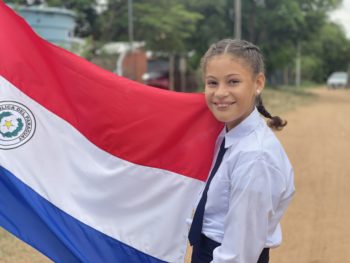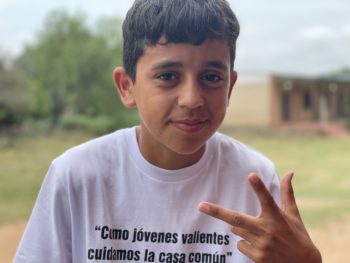In the Central Department of Paraguay, along the border with Argentina, in the city of Asunción, you can find the Escuela Caacupemí de Fe y Alegría. This school serves a community called Bañado Norte. There is no running water at the school. Some students walk 45 minutes down dirt paths to attend classes. But they have families and teachers who believe that students not only have the right to basic living conditions, but also the right to education.
 If you visit this little school, off the main road and right along the Paraguay river, you might run into Johana. Her favorite subject is math. She gets into fights with her younger sister over toys. She wants to be a teacher when she grows up. She loves school because she enjoys learning.
If you visit this little school, off the main road and right along the Paraguay river, you might run into Johana. Her favorite subject is math. She gets into fights with her younger sister over toys. She wants to be a teacher when she grows up. She loves school because she enjoys learning.
Or you may have the chance to meet Iván. He has four sisters. He loves school because it gives him a safe space to play and learn math (that’s his favorite subject too). When he is older, he wants to be “an important lawyer” so he knows that school is key to achieving that dream.
Unfortunately, Johana and Iván aren’t always able to attend school. Sometimes the Escuela Caacupemí de Fe y Alegría is closed by flooding. Other times they can’t make it down the unpaved roads that lead to the school. And even when they do, the utilities are less than reliable.
When the Paraguay River swells during the rainy season, the Bañado Norte floods, and the 100,000 other residents of the neighborhood are forced to abandon their homes as the water can reach 12-15 feet high. With climate change, these floods are only increasing in strength and frequency.
 But 23 years ago, before Fe y Alegría arrived, there was no school in this neighborhood at all. The community was disconnected from resources and opportunities available in other parts of Asunción. They began to ask themselves: How could a school in this area of the world manage to prosper? How can students such as Johana and Iván find it a place of security, learning, hope, and community?
But 23 years ago, before Fe y Alegría arrived, there was no school in this neighborhood at all. The community was disconnected from resources and opportunities available in other parts of Asunción. They began to ask themselves: How could a school in this area of the world manage to prosper? How can students such as Johana and Iván find it a place of security, learning, hope, and community?
The answer they found was remarkably simple – it was mothers. A group of mothers rallied together to begin this center of learning. Twenty-three years ago, it was mothers who led the push for education and who continue to be the leaders both in the school and the community.
One of these mothers is Selva.
Today, she is the director of the school. She started as a volunteer 23 years ago and has never left. Her dream for the school is for each student’s right to education to be respected and care for our common home to be central to that education. Her goal for the community is to build the next generation of leaders. These future leaders are Johana and Iván. Fe y Alegría and the school are central to achieving that goal.
As Johana and Iván dream of becoming a teacher and a lawyer, and as their classmates have similar hopes for the future, Selva is an example of what the right to education does not just for one person, but for a whole community.
This is the inspiring impact that Fe y Alegría schools have throughout the Global South. This network of schools is driven by the Jesuits and committed to providing education to the marginalized and in areas where the asphalt literally ends. Fe y Alegría schools do not just provide a service to their students, they lift up whole communities and overcome all kinds of unique challenges. These schools plant deep roots in their communities. So deep that even flood waters cannot wash away the hope and promise they inspire.

